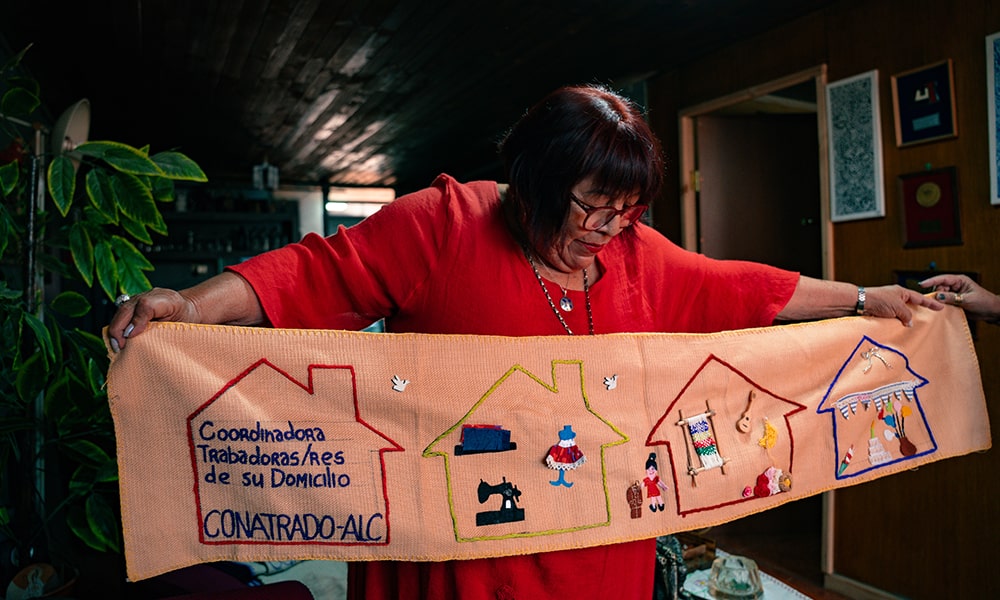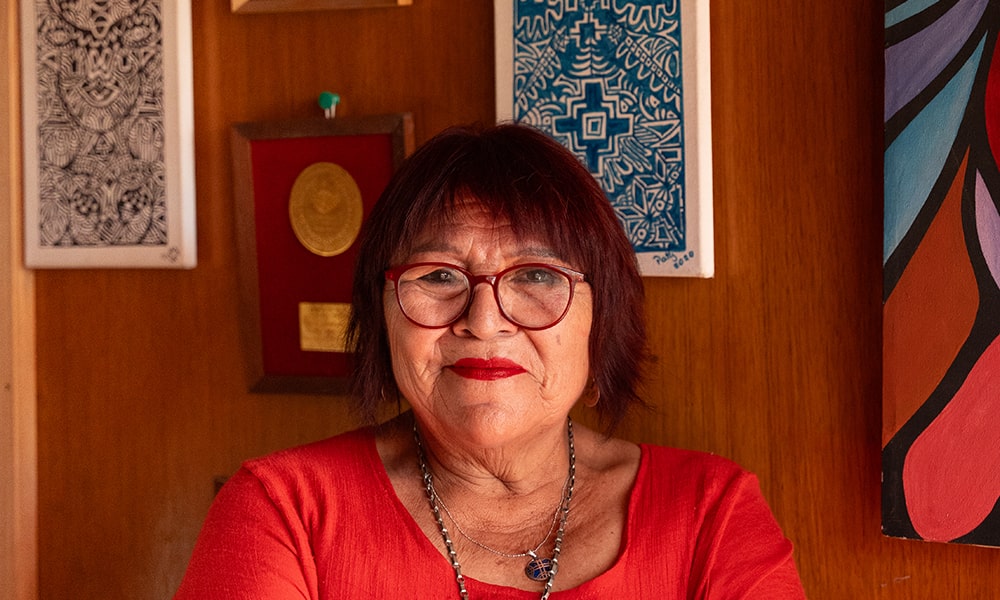When asked how many times she’s been arrested as an activist Patricia Coñoman Carrillo shrugs her shoulders. She’s never counted. It’s part of her work as a Chilean union activist and leader defending labour rights, particularly in the textile sector, for nearly 50 years.
The hardship she has faced is hard to fathom. When she and her husband were trying to rebuild unions in 1977 during Augusto Pinochet’s dictatorship, he was killed; she fled into exile for nine months, leaving her three daughters in the care of others. She couldn’t bear being apart from them and returned secretly to continue the rebuilding. During the dictatorship, she was president of the National Textile Confederation of Chile (CONEXTIL) (1975-2015), and a leader in the Central Unitaria de los Trabajadores (CUT) (1988-2017). At a union meeting, she recalls worker representatives voting for their board while soldiers pointing guns at them. When the dictatorship ended around 1990, she worked with international observers, unions and other movements to restore democracy.
The 73-year-old, great-grandmother, says her “bravery” comes from her “warrior blood” as a Machupe (Indigenous) woman born in Temuco, Chile. That ancestry adds another layer of discrimination to being a woman and homeworker.
“You have to be daring to be a leader,” she said. “You have to believe you are capable of leadership.” And “don’t lose the sense of where you come from — the place of poverty, of people with no social security — and know that we can change this reality, we can fight together.”
She pauses to consider other factors. Framed certificates and her art work cover the living room wall. “Education,” she announces, is essential for learning how to organize, how to talk to the media and explain your work and struggle. “You must never stop learning, keeping up to date on studies and news and what’s happening in the country and internationally…. As a leader, you should be able to speak on every topic.” She earned her social work degree in 2013.

However, the most important thing, she says, is to be able to understand people. “This is key.”
She holds up HomeNet International (HNI) as an example of how this works in practice. “There are many female leaders from different realities. The worse thing we can do is believe we are unique and exclusive. Good leadership involves sharing in solidarity.” This is precisely what HNI does.
“Our pain as invisible home-based workers is shared. HNI encourages us not to compete so that we can build up our world in a spirit of sisterhood and also respect for human rights as workers.”
“It’s great to see that when you get together with other female leaders from other parts of world, it’s like you renew your union vows…. Then you return home with renewed energy, eager to work… It’s really worth it,” she said.
When HomeNet International was being formed after 2021, Patricia was on its International working committee, which built and strengthened the organization prior to its formal approval by delegates in April 2023.
That same year, 2021, she ran for political office and won as Councilwoman for the El Bosque Commune (a region of Santiago). “My campaign was very modest, but as my mother said, I have the conviction to speak,” she told COTRADO ALAC. She believes she won because Chileans are tired of arrogant politicians who don’t know their constituents. “I know what happens there, so I can talk about the bad sidewalks, the power cuts, the lack of hospitals…we have a common language, a common voice. I see people cry and I am not ashamed to cry with them, because I feel that when one loses sensitivity, one cannot govern.” Her crowning achievement was to improve the “really bad” 24 schools and 17 kindergartens.
Today she continues as a homebased worker, including making macrame artworks and beautiful appliques depicting scenes and themes of Chile. She works at whatever is needed to survive, including cooking for other people. She also makes time for her daughters, who are now 52, 50 and 49 years old, eight grandchildren, and five greatgrandchildren. But she still prioritizes work as an activist.
She’s involved in two Indigenous movements: Ñuke Mapu (Mother Earth) and Nehuen Domo (strength of women) and is working to reorganize Chilean unions. At March elections she hopes to become president of one at the national level: the Sindicato de trabajadoras y trabajadores independientes y en domicilio lo Espejo.
“The idea of this is to represent all the workers in the country… not only home-based workers, but also workers with precarious employment from different sectors: street vendors, domestic workers, caregivers – all who work from home across the country.”
Why did she get involved in this struggle? “That’s easy to answer,” she said. “It’s because I’m a communist and I believe in the fight for a better and fairer society with social awareness. I will fight for my country and for the country I want for my daughters.” Moving forward with democracy is also a way to honour the many who were killed during the dictatorship.
Note: Patricia is featured in an 80-minute video: Testimony Museo de la memoria y los derochos Humanos.



